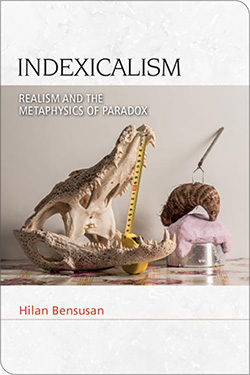
Graham Harman and Hilan Bensusan
Have you read Part 1 – 3?
Graham Harman: Another influence on your book is the appeal to “multinaturalism” that we find not only in Bruno Latour, but also in those concerned with Amerindian anthropologies: Philippe Descola, Déborah Danowski and Eduardo Viveiros de Castro, and others[i] The usual critique of such authors is that they subjectivize the world so that tribal cultures following analogism, fetishism, and totemism are placed on the same level as Western scientific naturalism. Are you also committed to cultural relativism of this sort, or do you find ways to modify these anthropological approaches in the direction of realism?
Hilan Bensusan: Indexicalism is indeed a way to understand Amerindian perspectivism as it is portrayed by the work of Tania Stolze Lima, Eduardo Viveiros de Castro and others[ii]. It is also a way to combine the disposition towards the non-human that Descola found in the Amazon (and other places), animism, according to which non-humans have interiorities so that to deal with them is not to extract their intelligibility but rather to negotiate with groups of them, with a notion of the others as transcendent along the lines espoused by Levinas. (This is what made me coin the term “Jewish animism” to describe indexicalism, which does justice both to my Jewish and Brazilian, but not Amazonian, origin.) I find Descola’s characterization of animism close in many aspects to Whitehead’s philosophical outlook, being oriented by a rejection of the bifurcation between what is experienced and what lies underneath experience, unreachable by it. In this sense, there is a family resemblance that would also include Latour’s politics of nature. In all these cases, there is no room for absolute opacity in what composes the field of experience that constitutes the furniture of the universe. In this sense, these positions contrast both with indexicalism and with your [Graham Harman’s] object-oriented ontology.
Descola holds that some animist groups are perspectivists, while Viveiros de Castro holds instead that perspectivism is quite widespread in the lower Amazon and challenges the very general notion of animism proposed by Descola. Perspectivism holds that terms like ‘human’, ‘animal’ or ‘food’ are deictic and could be translated into different substantives in different contexts of utterance: ‘food’ can be resolved as the substantive ‘humans’ for the jaguar, while ‘human’ can be resolved as the substantive ‘wild boar’ for wild boars. What is common in different contexts is the articulation of the indexical terms, but nothing substantive is common between the contexts in which humans and jaguars live: ‘manioc beer’, an indexical that commands some behaviors such as rushing towards it and making efforts to prepare it, could be resolved as manioc beer for humans and as blood for jaguars. The terms, however, express no substantives but are thoroughly indexical: the similarities between blood as a substantive for both jaguars and humans can hardly be expressed as perspectivist thinking revolving around indexicals. According to this account, there is a great deal of indexicalism taking place among perspectivist groups. (It is worth noting that ‘perspectivism’ itself is used to describe both human groups in the lower Amazon and an approach to humans and non-humans that Viveiros de Castro recommends, inspired by these groups.)
I disagree that perspectivism is a form of cultural relativism. To begin with, it is not about culture, because if there is a culture among these lower Amazon groups it is always the same for both humans and animals: nature (that is, the body) is what is different, as the term ‘multinaturalism’ indicates. It is nature that varies, and that means truth is not relative, but rather complex, diverse, plural and filled with perspectives. In a nutshell, relativity is true. It is worth comparing Amerindian perspectivism with the two non-standard A-ist forms of realism about time that Kit Fine has proposed: he calls one of them ‘perspectivism’ and the other ‘fragmentalism’[iii]. A-ists think, with John McTaggart, that time cannot be properly understood without the aid of the A-series – the series formed by yesterday, today and tomorrow or last year, this year, next year but not by 2020, 2021, 2022[iv] . McTaggart held that because it relies on the A-series, time cannot be real. A-ist realists disagree with this latter claim and hold, largely in convergence with indexicalism, that reality could indeed include time if it is not neutral, absolute or coherent. While standard A-ist realisms understand that reality is not neutral and the present time is the one that is real, non-standard ones reject the claims that reality is absolute or is coherent– in Fine’s terminology these are perspectivism and fragmentalism, respectively. Perspectivism, in this sense, understands that reality is positioned and must be distinguished from subjectivism in the same way that indexicalism is. Perspectivism and fragmentalism are committed to the reality of tense (see my article “The Cubist Object” and the section of Indexicalism called “Tense Realism and Baroque Realism”).[v]
Similarly, anthropological perspectivism is a form of realism about perspectives. It doesn’t subjectivize the world, but fills it with positions that cannot be properly considered except as a situated endeavor. It is, I think, closer to indexicalism than the two opponents I mentioned above: the claim that things are subjective, and the claim that they can be viewed from nowhere. Still, there could be an impression that there is too much relativism here, since it is maintained by perspectivist anthropologists that although naturalists and animists (or perspectivists) carve the distinction between nature and culture at the same joint, they ascribe opposite properties to each side. Nevertheless, the impression that such a position lies far from realism subsists only if indexicalism is not considered seriously. If it is, it becomes clear that reality could be composed of a diversity of perspectives and a diversity of positions that can only be viewed as a unified reality at the risk of paradox. The difficulty here is the same as with indexicalism and the remedy is similar: bite the bullet (of paradoxico-metaphysics) and make sure that substantivism is properly rejected in its different forms. I would claim that perspectivism, if it is a general view of how things are, should instead embrace indexicalism as a situated metaphysics. This would still be puzzling for some, because it entails that it is simultaenously a metaphysics and a critique of metaphysics. But I argue that it is a robust form of realism: a realism about positions, and therefore about what is exterior to any position.
Having said so, I would still briefly voice some disagreement with perspectivism as embraced by anthropologists such as Viveiros de Castro. Contrary to indexicalism, perspectivist anthropologists tend to hold a view that has no room for transcendent otherness, for an absolute Great Outdoors. They tend to think instead, with Whitehead and Deleuze, that everything merges into a single unified reality brought about by the many perspectives. No outside is disclosed by examining what there is: the idea is that immanence, and the state of being in the middle of everything, exclude any exterior. In that sense, it tends toward a metaphysics of subjectivity (or subjectalism, in Meillassoux’s terminology). Perspectivism, like Descola’s Amerindian animism, is therefore closer to Whitehead and Deleuze than to indexicalism. This is why it needs to be amended with a Levinasian component. The metaphysics of the others would be a way to make increased sense of a world where different perspectives join together without ever overcoming the situated character of reality.
Graham Harman: In your book (and even in this interview so far) you are rather hard on what you call “substantivism,” blaming it not just for bad philosophy, but for patriarchy and a litany of other political crimes. I wonder if that’s really fair. In the first place, it might be asked whether it is even possible to link specific ontologies with specific political positions, given that the greatest philosophers have generally been useful to people of all political stripes. There are both “Left” and “Right” Kantians, Hegelians, Nietzscheans, and even Heideggerians for instance. The other objection someone might make is that Aristotle’s theory of substance was a radical progressive break with previous Greek philosophy in the sense that his substances can be destroyed, can have different qualities at different times, are both individual and ambiguous, and therefore deserves more admiration than it usually receives in recent philosophy. So, why do you dislike substantivism so much?
Hilan Bensusan: To improve the world, it is clearly not enough to propose a philosophically general diagnosis of what grounds what needs to be changed or removed. Yet a diagnosis of this sort may help to illuminate what is at stake and to direct the efforts. To be sure, political action is also needed, and together with this, a view on other issues that divide Left and Right. But philosophical diagnoses provide relevant orientation for struggle including the struggle that is conducted through theoretical developments.
Substantivism is indeed taken to be a philosophical culprit by my way of proposing indexicalism. Similarly, metaphysics (or onto-theology, or the metaphysics of presence) is the offender according to Heidegger. For him, metaphysics is committed to an endeavor to make things transparent, to extract their intelligibility and to make them subject to command, while substantivism for me is a non-situated view of things that conceives of no respectable obstacle for making everything exposed. The two diagnoses are similar, but what matters for me here is that they have effects. There could be Right and Left Heideggerians, but both are committed to the criticism of metaphysics that arises from Heidegger: both sides are enhanced in their analysis by Heidegger’s reflections on the effects of metaphysics. Further, both sides would endorse these reflections and the corresponding diagnosis. Similarly, indexicalists of different persuasions would be faithful to a refusal of substantivism and endorse a situated metaphysics. Indexicalism has a broad political impact, as the history of being that Heidegger proposed, partly as a consequence of the way he came to read Nietzsche. It has an impact on what I call cosmopolitics (which is a bit different from what Isabelle Stengers has in mind) and I have indeed shown how the same cosmopolitical parties admit of macro-political right and left leanings[vi]. Cosmopolitical disputes are orthogonal to other, macro-political ones (see my articles “Cosmopolitical Parties in the Post-Human Age”, “Geist and Ge-Stell” and the forthcoming “Cosmopolitics as a Taste for Cunning”)[vii]. The metaphysics of the others is engaged in struggle against the view of nowhere, and this can indeed have different macro-political implications. There are connections between philosophical studies, cosmopolitical disputes and macro-political issues, but the passages between these domains are maybe like the Northwest passage through Canada from the Arctic to the Pacific.
But perhaps things here are even more entangled. Indexicalistm –and indeed the situated metaphysics of the others– has a strong case against colonialism that is elaborated mostly in the Coda of the book. Coloniality is grounded on the substantivist idea that the others can be included in a unified project that ultimately leaves no room for the exterior or the outdoors: it is grounded on a non-situated hybris of ground zero, to use the expression of Santiago Castro-Gómez[viii]. The Coda of Indexicalism is called “The Circumscription of Potosí”, and accounts for the fact that the book was partially written around the Sumaq Urqo, the mountain filled with silver that made the wealth of Europe in the 17th Century[ix]. There is a sense in which the history of the world ever since has the mountain at its center; the circumscription of Potosí is a position that contrasts with that of the current colonial center and sees it as an outdoors that leaves traces inside. Silvia Rivera Cusicanqui takes these traces to produce a tainted form of life, and no pure form of life is indeed possible if thought is situated and affected by what is exterior to it[x]. This is what she labels with the Aymara word ch’ixi, which she claims should be at the cornerstone of life after colonization: not a struggle towards purity, but rather the adoption of a plurality of forms of life that resists the integration and unification that is favored by colonial powers. Ch’ixi is the idea that other narratives have space in the effort to tell the world using the best of my capacities, to use the phrase of Anna Tsing that orients the metaphysics of the others in the book[xi]. Ch’ixi contrasts with substantivist views that favor a general and transparent view from nowhere. The struggle against colonization is the struggle for the right to opacity, as Edouard Glissant sometimes put it: the right not to be exposed and not to become part of a totality that dissolves any peculiarity[xii]. A situated metaphysics has a struggle against coloniality in its veins. Similarly, its diagnosis may strongly help to advance some other local, contextualized political causes.
As for substances in Aristotle, it is relevant to distinguish between substantialism (or metaphysics of presence, as ousia is translated as substance and as presence) on the one hand and substantivism on the other. The former includes Aristotle and the tradition of metaphysics that, according to Heidegger, lost its connection with the Pre-Platonic physis in its capacity to unfold and withdraw: metaphysics is a path towards complete transparency. This trespassing of the right to opacity carried on all the way to Nietzsche, the last metaphysician according to Heidegger, and can carry on beyond him as metaphysics without making any significant new step[xiii]. To some extent, Whitehead is part of this effort to make things transparent even though he posits no substance and arguably leaves no space for any full-blown presence. Indexicalism rejects both substances and the effort to make everything transparent precisely because it is committed to a form of realism about the Great Outdoors. Now, substantivism, the opposite of indexicalism, is both different and in an important sense broader. Whitehead’s process philosophy is not substantialist but is still substantivist, since it posits substantives (including prehensions, which play a role similar to relations in other systems). To be against substantivism is to be against any non-situated view of things: that is, against views that postulate substances, but also against those that postulate only relations or states-of-affairs if they are not ultimately indexical. Substantivism is a strategy to abolish any situatedness in philosophy, and with that to exorcise the opacity of the exterior, the transcendence of the Great Outdoors and the reality of the others.
Read on…
Parts 5 in A Conversation with Graham Harman and Hilan Bensusan on ‘Indexicalism‘
Get your copy of Indexicalism here
Proposes a radical new metaphysics where reality is not substantive but is indexical
- Puts forward a new theory of metaphysics where the furniture of the universe is deictic and substantives are conceived as thoroughly situate
- Extends the idea of metaphysics as transcendence, proposed by Levinas, to a process philosophy where the Other is not only human but ultimately the Great Outdoors
- Presents an approach to perception that makes it close to a conversation which portrays conceptual mediation as a special case of the Whiteheadian notion of importance
About the speakers…
Graham Harman is Distinguished University Professor of Philosophy at Southern California Institute of Architecture (on leave from the American University in Cairo). His previous books include Tool-Being (2002), Guerrilla Metaphysics (2005), Heidegger Explained (2007), Prince of Networks (2009), Towards Speculative Realism (2010), Circus Philosophicus (2010), L’Objet quadruple (2010), and The Prince and the Wolf [with Bruno Latour and Peter Erdélyi] (2011).
Hilan Bensusan is Professor of Contemporary Philosophy at the University of Brasilia. He is the author of Being Up for Grabs: On Speculative Anarcheology (Open Humanities Press, 2016). His other books are published in Portuguese: A diáspora da agência – Ensaio sobre o horizonte das monadologias (The diaspora of agency – Essay on the horizon of monadologies) (EdUFBA, 2018), Linhas de animismo futuro (Lines of future animism) (Mil Saberes, 2017), Heráclito – Exercícios de Anarqueologia (Heraclitus – Exercises in anarcheology) (Ideias e Letras, 2012) and Excessos e Exceções (Excesses and exceptions) (Ideias e Letras, 2008).
[i] Bruno Latour, Politics of Nature: How to Bring the Sciences Into Democracy, trans. C. Porter. (Cambridge, MA: Harvard University Press, 2004); Philippe Descola, Beyond Nature and Culture, trans. J. Lloyd. (Chicago: University of Chicago Press, 2014); Déborah Danowski & Eduardo Viveiros de Castro, The Ends of the World, trans. R. Guimaraes Nunes. (Cambridge, UK: Polity, 2016.)
[ii] Tania Stolze Lima, “O dois e seu múltiplo: reflexões sobre o perspectivismo em uma cosmologia tupi,” Mana 2.2 (1996), pp. 21-47.
[iii] Kit Fine, “Tense and Reality,” in Modality and Tense: Philosophical Papers, pp. 261-320. (Oxford: Oxford University Press, 2005.)
[iv] John Ellis McTaggart, “The Unreality of Time,” Mind 17.68 (1908), pp. 457-474.
[v] Hilan Bensusan, “The Cubist Object: Black Boxes, Über-realism and the Metaphysics of Perspectives,” Speculations 2 (2012), pp. 169-186; Hilan Bensusan, Indexicalism, pp. 39-42.
[vi] Isabelle Stengers, Cosmopolitics I, trans. R. Bononno. (Minneapolis: University of Minnesota Press, 2003.)
[vii] Hilan Bensusan, “Cosmopolitical Parties in the Post-Human Age,” &&& Platform, November 16, 2020, online; Hilan Bensusan, “Geist and Ge-Stell: Beyond the Cybernihilist Convergence of Intelligence,” Cosmos and History 16.2 (2020), p. 94-117; Hilan Bensusan, “Cosmopolitics as a Taste for Cunning,” forthcoming.
[viii] Santiago Castro-Gómez, Critique of Latin American Reason, trans. A. Ascherl. (New York Columbia Univrersity Press, 2021.)
[ix] Bensusan, Indexicalism, pp. 184-200.
[x] Silvia Rivera, Principio Potosí Reverso. (Madrid: Museo Nacional Centro de Arte Reina Sofía, 2010.)
[xi] Anna Tsing, The Mushroom at the End of the World: On the Possibility of Life in Capitalist Ruins. (Princeton: Princeton University Press, 2015.)
[xii] Edouard Glissant, The Poetics of Relation, trans. B. Wing. (Ann Arbor, MI: University of Michigan Press, 1997.)
[xiii] Martin Heidegger, Nietzsche, vol. 1: The Will to Power as Art, Nietzsche, vol. 2: The Eternal Recurrence of the Same, trans. D.F. Krell. New York: Harper, 1991.






